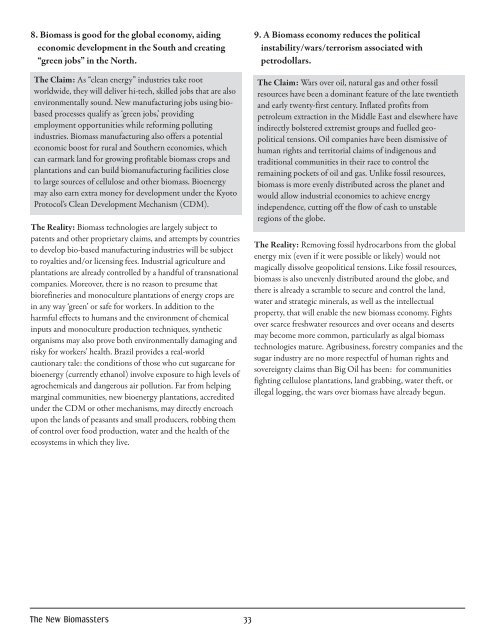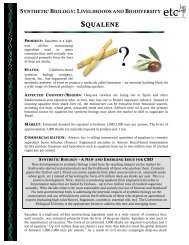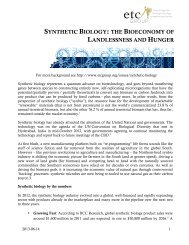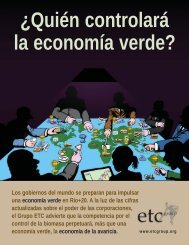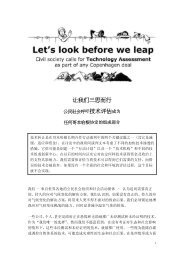The New Biomassters - Convention on Biological Diversity
The New Biomassters - Convention on Biological Diversity
The New Biomassters - Convention on Biological Diversity
Create successful ePaper yourself
Turn your PDF publications into a flip-book with our unique Google optimized e-Paper software.
8. Biomass is good for the global ec<strong>on</strong>omy, aiding<br />
ec<strong>on</strong>omic development in the South and creating<br />
“green jobs” in the North.<br />
<str<strong>on</strong>g>The</str<strong>on</strong>g> Claim: As “clean energy” industries take root<br />
worldwide, they will deliver hi-tech, skilled jobs that are also<br />
envir<strong>on</strong>mentally sound. <str<strong>on</strong>g>New</str<strong>on</strong>g> manufacturing jobs using biobased<br />
processes qualify as ‘green jobs,’ providing<br />
employment opportunities while reforming polluting<br />
industries. Biomass manufacturing also offers a potential<br />
ec<strong>on</strong>omic boost for rural and Southern ec<strong>on</strong>omies, which<br />
can earmark land for growing profitable biomass crops and<br />
plantati<strong>on</strong>s and can build biomanufacturing facilities close<br />
to large sources of cellulose and other biomass. Bioenergy<br />
may also earn extra m<strong>on</strong>ey for development under the Kyoto<br />
Protocol’s Clean Development Mechanism (CDM).<br />
<str<strong>on</strong>g>The</str<strong>on</strong>g> Reality: Biomass technologies are largely subject to<br />
patents and other proprietary claims, and attempts by countries<br />
to develop bio-based manufacturing industries will be subject<br />
to royalties and/or licensing fees. Industrial agriculture and<br />
plantati<strong>on</strong>s are already c<strong>on</strong>trolled by a handful of transnati<strong>on</strong>al<br />
companies. Moreover, there is no reas<strong>on</strong> to presume that<br />
biorefineries and m<strong>on</strong>oculture plantati<strong>on</strong>s of energy crops are<br />
in any way ‘green’ or safe for workers. In additi<strong>on</strong> to the<br />
harmful effects to humans and the envir<strong>on</strong>ment of chemical<br />
inputs and m<strong>on</strong>oculture producti<strong>on</strong> techniques, synthetic<br />
organisms may also prove both envir<strong>on</strong>mentally damaging and<br />
risky for workers’ health. Brazil provides a real-world<br />
cauti<strong>on</strong>ary tale: the c<strong>on</strong>diti<strong>on</strong>s of those who cut sugarcane for<br />
bioenergy (currently ethanol) involve exposure to high levels of<br />
agrochemicals and dangerous air polluti<strong>on</strong>. Far from helping<br />
marginal communities, new bioenergy plantati<strong>on</strong>s, accredited<br />
under the CDM or other mechanisms, may directly encroach<br />
up<strong>on</strong> the lands of peasants and small producers, robbing them<br />
of c<strong>on</strong>trol over food producti<strong>on</strong>, water and the health of the<br />
ecosystems in which they live.<br />
9. A Biomass ec<strong>on</strong>omy reduces the political<br />
instability/wars/terrorism associated with<br />
petrodollars.<br />
<str<strong>on</strong>g>The</str<strong>on</strong>g> Claim: Wars over oil, natural gas and other fossil<br />
resources have been a dominant feature of the late twentieth<br />
and early twenty-first century. Inflated profits from<br />
petroleum extracti<strong>on</strong> in the Middle East and elsewhere have<br />
indirectly bolstered extremist groups and fuelled geopolitical<br />
tensi<strong>on</strong>s. Oil companies have been dismissive of<br />
human rights and territorial claims of indigenous and<br />
traditi<strong>on</strong>al communities in their race to c<strong>on</strong>trol the<br />
remaining pockets of oil and gas. Unlike fossil resources,<br />
biomass is more evenly distributed across the planet and<br />
would allow industrial ec<strong>on</strong>omies to achieve energy<br />
independence, cutting off the flow of cash to unstable<br />
regi<strong>on</strong>s of the globe.<br />
<str<strong>on</strong>g>The</str<strong>on</strong>g> Reality: Removing fossil hydrocarb<strong>on</strong>s from the global<br />
energy mix (even if it were possible or likely) would not<br />
magically dissolve geopolitical tensi<strong>on</strong>s. Like fossil resources,<br />
biomass is also unevenly distributed around the globe, and<br />
there is already a scramble to secure and c<strong>on</strong>trol the land,<br />
water and strategic minerals, as well as the intellectual<br />
property, that will enable the new biomass ec<strong>on</strong>omy. Fights<br />
over scarce freshwater resources and over oceans and deserts<br />
may become more comm<strong>on</strong>, particularly as algal biomass<br />
technologies mature. Agribusiness, forestry companies and the<br />
sugar industry are no more respectful of human rights and<br />
sovereignty claims than Big Oil has been: for communities<br />
fighting cellulose plantati<strong>on</strong>s, land grabbing, water theft, or<br />
illegal logging, the wars over biomass have already begun.<br />
<str<strong>on</strong>g>The</str<strong>on</strong>g> <str<strong>on</strong>g>New</str<strong>on</strong>g> <str<strong>on</strong>g>Biomassters</str<strong>on</strong>g> 33


